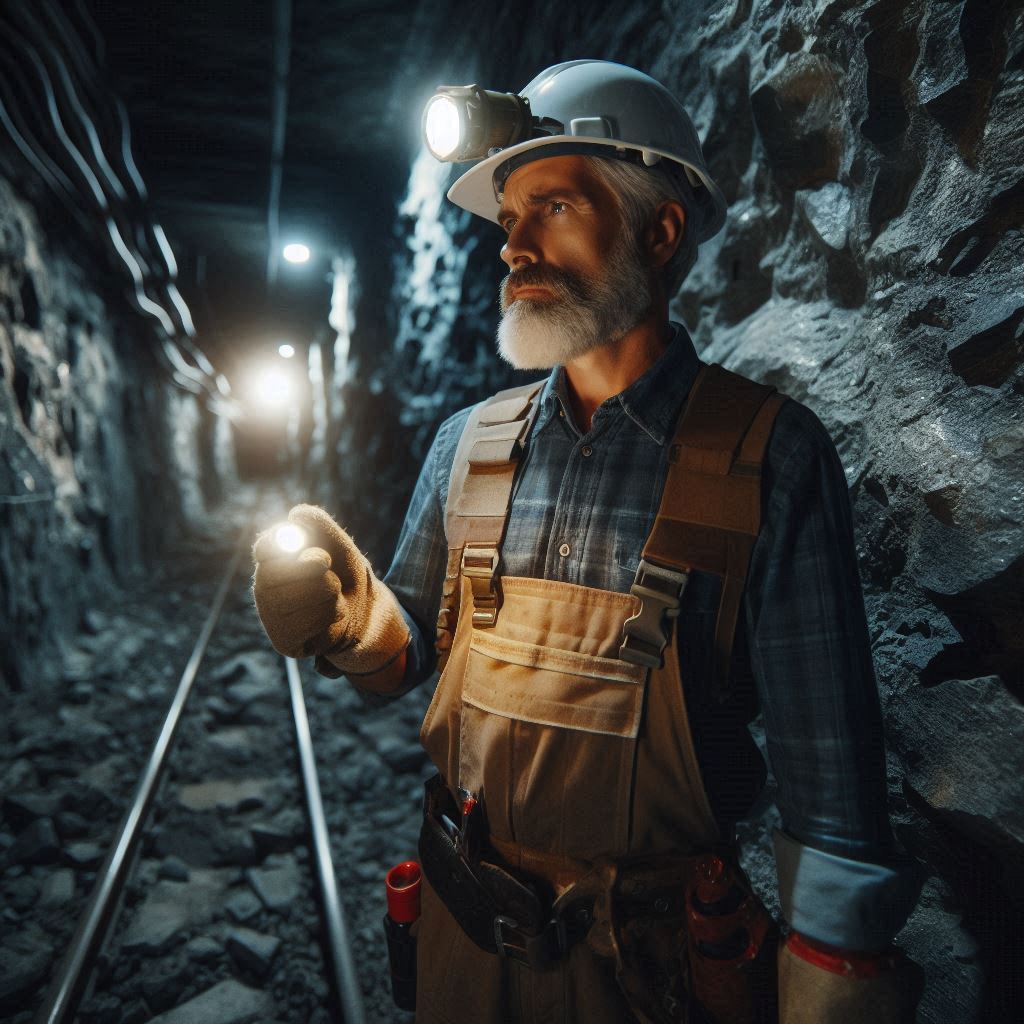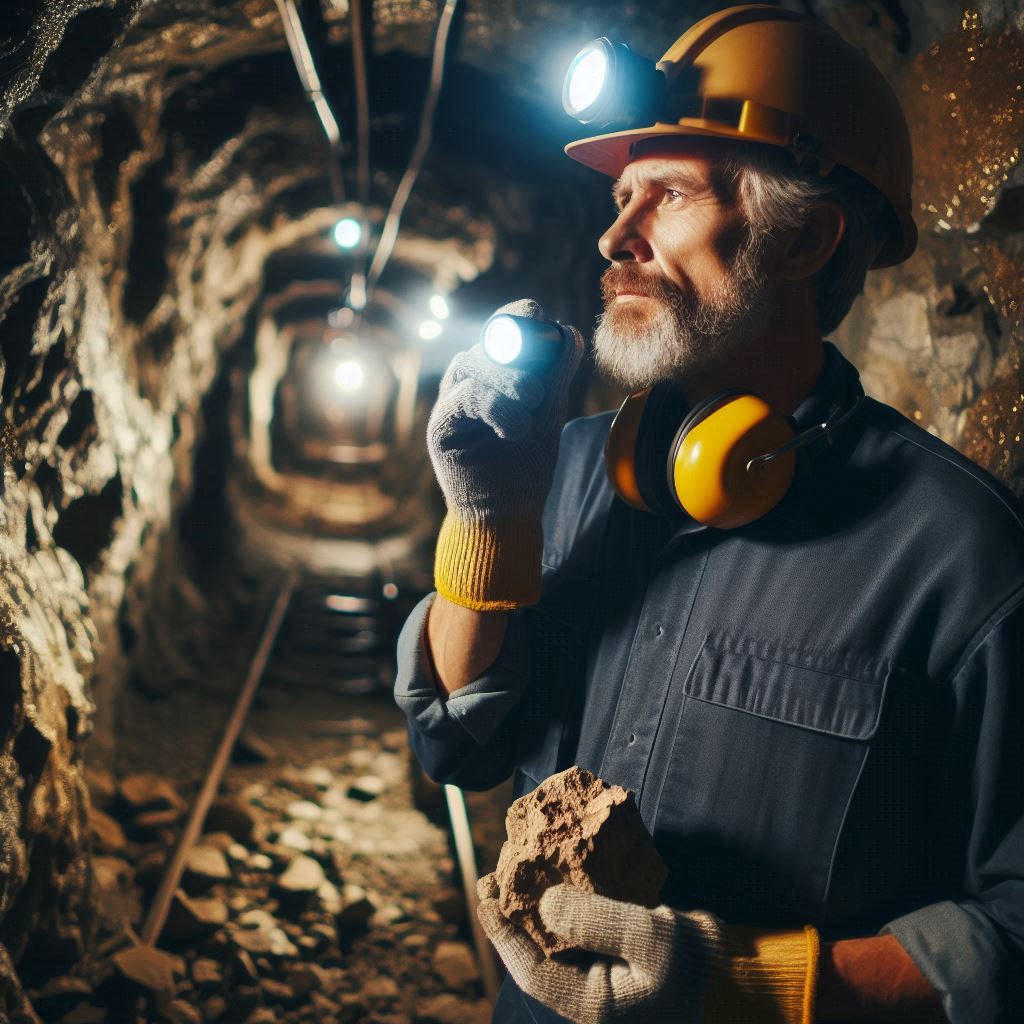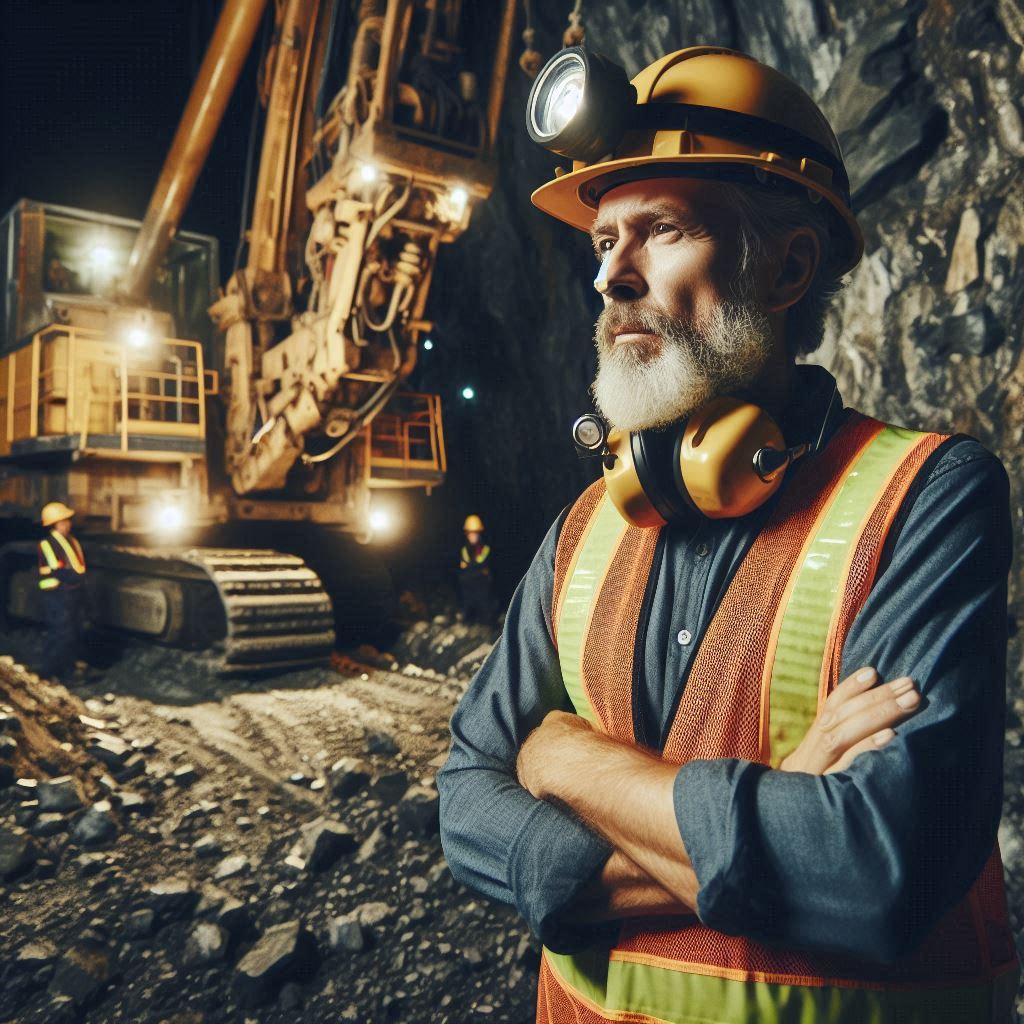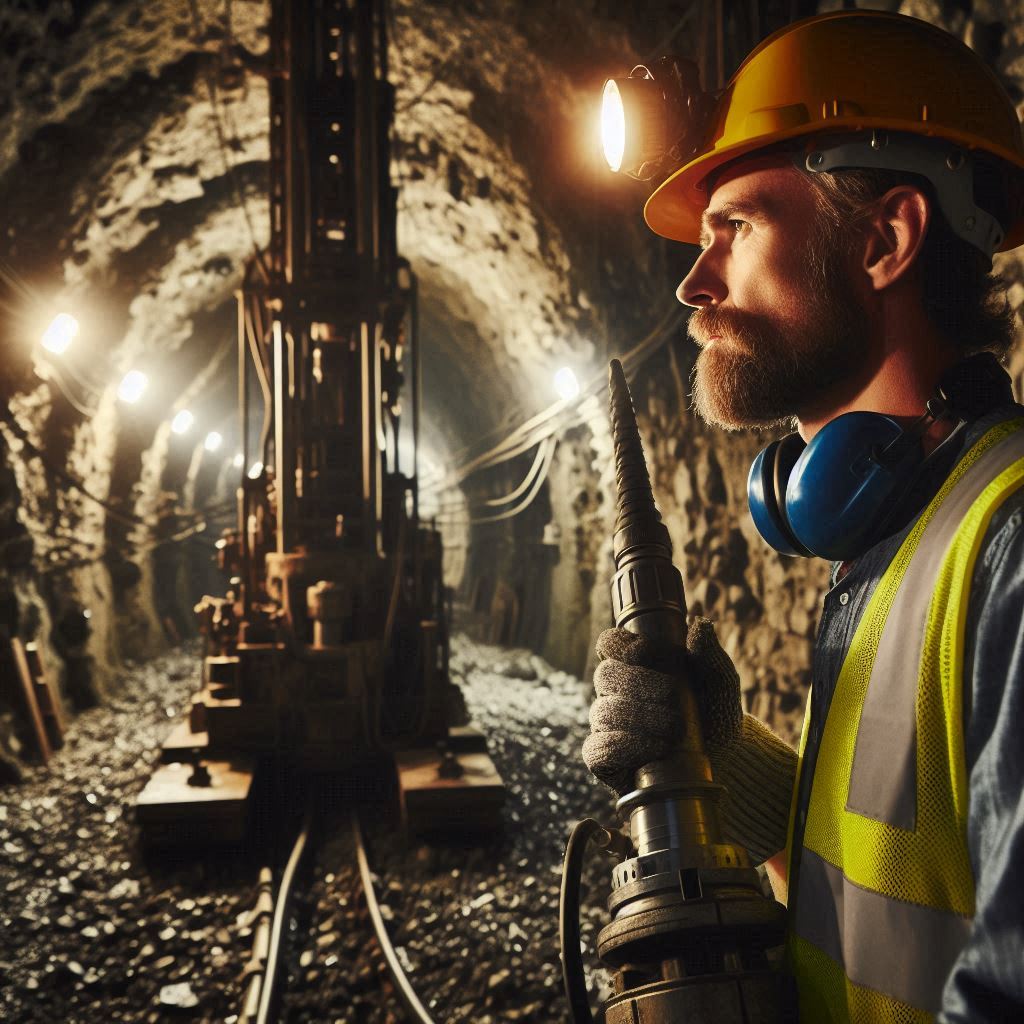Introduction
Mining engineers design and oversee the processes used to extract minerals from the earth.
They play a crucial role in mining operations, ensuring the extraction process is efficient, safe, and environmentally responsible.
Mining engineers are essential for resource extraction, contributing significantly to the industry’s success.
They ensure that minerals are obtained in a way that minimizes environmental impact and maximizes economic benefits.
To become a mining engineer, one must follow specific educational pathways that provide the necessary skills and knowledge.
Brief Overview of What a Mining Engineer Does
Mining engineers plan and design mines, ensuring the safe and efficient extraction of minerals.
They evaluate geological data, develop mine plans, and oversee operations to ensure safety and productivity.
Their responsibilities include designing open-pit and underground mines, managing extraction processes, and ensuring compliance with safety regulations.
They also collaborate with other engineers, geologists, and environmental scientists to optimize mining operations and address environmental concerns.
By using advanced technologies, mining engineers improve mining techniques and reduce environmental impact.
Importance of Mining Engineers in the Industry
Mining engineers are vital to the mining industry, providing expertise that ensures the effective extraction of resources.
Their work supports the production of essential materials used in various industries, from construction to technology.
Without mining engineers, the industry would struggle to meet safety standards, environmental regulations, and efficiency goals.
They play a key role in reducing environmental damage and ensuring sustainable mining practices.
By implementing innovative technologies and practices, mining engineers help the industry adapt to changing economic and environmental conditions, ensuring long-term viability.
Highlight the Different Educational Pathways to Becoming a Mining Engineer
Several educational pathways lead to a career as a mining engineer.
The most common route is earning a bachelor’s degree in mining engineering or a related field.
These programs typically include coursework in geology, mine design, and mineral processing, providing a solid foundation in mining principles.
Many universities offer specialized mining engineering programs, which combine theoretical knowledge with practical experience through internships and laboratory work.
Some students may choose to pursue a master’s degree to gain advanced knowledge and enhance their career prospects.
Alternatively, individuals with degrees in other engineering disciplines, such as civil or mechanical engineering, can transition into mining engineering through additional coursework or on-the-job training.
These engineers often bring valuable skills and perspectives to the field, contributing to innovative solutions in mining operations.
Professional certifications and licensure, such as the Professional Engineer (PE) license, can also enhance a mining engineer’s qualifications and career opportunities.
Continuing education and professional development are crucial for mining engineers to stay current with industry advancements.
Many professionals participate in workshops, conferences, and training programs to learn about new technologies and best practices.
By staying updated, mining engineers can ensure their skills remain relevant and contribute to the industry’s growth and sustainability.
In summary, becoming a mining engineer requires a combination of formal education, practical experience, and continuous learning.
The educational pathways to this career are diverse, allowing individuals to tailor their education to their interests and career goals.
Whether through a specialized mining engineering program or a related engineering discipline, aspiring mining engineers have multiple options to pursue this rewarding and impactful career.
High School Preparation
The Importance of Taking Math and Science Courses
High school students aspiring to become mining engineers must prioritize math and science courses.
These subjects lay the foundation for engineering principles essential in mining.
Math, especially calculus and algebra, develops problem-solving skills vital for engineering tasks.
Physics and chemistry provide an understanding of the natural processes involved in mining operations.
High grades in these courses can also enhance college applications, demonstrating the student’s capability to handle rigorous engineering programs.
Hence, excelling in math and science during high school is crucial for future mining engineers.
Joining Clubs or Organizations Related to Engineering or Mining
Joining engineering or mining-related clubs or organizations in high school is highly beneficial.
These clubs offer students practical experiences that go beyond classroom learning.
Participation in engineering clubs, such as robotics or environmental clubs, helps students understand engineering concepts through hands-on projects.
Additionally, involvement in these organizations can provide networking opportunities with professionals and peers interested in engineering.
These connections can offer insights into the mining field and help in building a strong foundation for a future career in mining engineering.
Seek Out Internships or Volunteer Opportunities in the Field
Gaining practical experience through internships or volunteer opportunities is invaluable for aspiring mining engineers.
Internships at local mining companies or engineering firms provide firsthand experience in the field.
These opportunities allow students to apply theoretical knowledge in real-world settings, giving them a taste of their future career.
Volunteer work, such as participating in environmental conservation projects, can also offer relevant experience.
Engaging in these activities not only enriches a student‘s resume but also provides a deeper understanding of the mining industry‘s practical aspects.
Read: Biomedical Engineering: Industry Outlook 2024
Undergraduate Degree Options
The Various Engineering Disciplines That Can Lead to a Career in Mining Engineering
Mining engineering often requires a strong foundation in various engineering disciplines.
A degree in civil engineering can pave the way to a career in mining engineering.
Civil engineers design and oversee construction projects, which include mines.
Mechanical engineering is another relevant field.
Mechanical engineers develop and maintain machinery used in mining operations.
They ensure that equipment functions efficiently and safely.
Electrical engineering also offers a pathway.
Electrical engineers design electrical systems crucial for modern mining operations.
They focus on power supply and automation in mines.
Another key discipline is geological engineering.
Geological engineers study the earth’s materials, crucial for identifying mining sites.
Their expertise in geology and engineering principles is invaluable.
Environmental engineering is also important.
Environmental engineers work to mitigate the environmental impact of mining.
They ensure compliance with environmental regulations.
Chemical engineering can also lead to a mining career.
Chemical engineers process minerals and develop methods to extract valuable materials.
Specific Programs or Universities Known for Their Mining Engineering Programs
Several universities offer renowned mining engineering programs.
The Colorado School of Mines is a leader in the field.
It offers comprehensive undergraduate programs in mining engineering.
The University of Arizona also has a strong reputation.
Its mining and geological engineering program is well-regarded.
The South Dakota School of Mines and Technology offers a robust curriculum.
It focuses on both theoretical and practical aspects of mining engineering.
The University of Nevada, Reno, is another top institution.
Its mining engineering program provides extensive fieldwork opportunities.
The University of Queensland in Australia is internationally recognized.
Its mining engineering program emphasizes sustainability and innovation.
The University of British Columbia in Canada offers a cutting-edge program.
It integrates advanced technology and environmental stewardship.
Additionally, the Missouri University of Science and Technology provides a solid foundation.
Its program covers all aspects of mining engineering, from exploration to reclamation.
Importance of Hands-on Experience Through Internships or Co-op Programs
Hands-on experience is crucial in mining engineering.
Internships and co-op programs provide invaluable real-world exposure.
They allow students to apply classroom knowledge in practical settings.
Internships offer opportunities to work with experienced professionals.
Students gain insights into daily mining operations and challenges.
They also learn about safety protocols and industry standards.
Co-op programs extend this experience.
They involve longer-term placements in mining companies.
These programs often alternate with academic semesters.
Practical experience enhances problem-solving skills.
Students learn to navigate complex engineering challenges.
They also build professional networks.
These connections can lead to future job opportunities.
Hands-on experience is essential for developing technical competencies.
It helps students understand the intricacies of mining equipment.
They learn to troubleshoot and optimize machinery performance.
Additionally, practical experience fosters a deeper understanding of environmental impact.
Students learn to implement sustainable practices in mining operations.
Internships and co-op programs are often required for graduation.
They ensure that students are job-ready.
Mining companies value candidates with practical experience.
It demonstrates their ability to adapt to the industry’s demands.
Hands-on experience is a cornerstone of mining engineering education.
It bridges the gap between theory and practice.
Students emerge as well-rounded professionals ready to tackle industry challenges.
Read: Biomedical Engineering: Research and Development
Graduate Degree Considerations
The Benefits of Pursuing a Master’s Degree in Mining Engineering or a Related Field
A Master’s degree in mining engineering or a related field provides advanced knowledge and skills.
This degree deepens understanding of mining processes, resource management, and safety regulations.
It also opens doors to higher-level positions and increased earning potential.
Professionals with a Master’s degree are often preferred for roles in research, consultancy, and managerial positions.
Advanced coursework and practical experiences offer insights into cutting-edge technologies and industry best practices.
This education level demonstrates commitment and expertise, enhancing career prospects and job security in the mining sector.
The Different Specializations Available Within Mining Engineering
Mining engineering offers several specializations tailored to various interests and career goals.
Common specializations include mineral processing, geological engineering, and environmental management.
Mineral processing focuses on extracting valuable minerals from ore.
Geological engineering involves studying earth materials to locate mineral deposits and ensure safe extraction practices.
Environmental management addresses the impact of mining activities on ecosystems and aims to implement sustainable practices.
Each specialization requires distinct skill sets and knowledge, allowing professionals to choose a path aligned with their interests and career aspirations.
Research Opportunities or Industry Collaborations Available at the Graduate Level
Graduate programs in mining engineering often provide research opportunities and industry collaborations.
These opportunities allow students to work on cutting-edge projects and contribute to advancements in the field.
Research may involve developing new technologies for ore extraction, improving environmental management practices, or enhancing safety protocols.
Collaborations with industry partners offer practical experience and networking opportunities.
Students might engage in internships or joint research projects with mining companies, government agencies, or research institutions.
These experiences enrich their education and increase their employability upon graduation.
Read: Exploring Subfields of Aerospace Engineering

Professional Certifications and Licenses
Importance of Obtaining Relevant Certifications or Licenses for Mining Engineers
Certifications and licenses are crucial for mining engineers.
They validate expertise and adherence to industry standards.
These credentials enhance career prospects and credibility.
Mining engineers often work on complex and safety-critical projects.
Employers and clients expect proof of qualifications and professional competence.
Obtaining certifications demonstrates commitment to the profession and ongoing learning.
It also helps in meeting regulatory requirements and securing project approvals.
Additionally, certifications can open doors to specialized roles and higher responsibilities within the field.
Overall, they play a significant role in career advancement and professional development.
Requirements for Obtaining Certifications such as the Professional Engineer (PE) License
To obtain a Professional Engineer (PE) license, candidates must meet specific requirements.
First, they need an accredited engineering degree, usually a Bachelor‘s in Mining Engineering.
Following graduation, candidates must gain relevant work experience under a licensed PE.
This typically involves four years of supervised practice.
After gaining the necessary experience, candidates must pass the PE exam.
The exam tests knowledge in engineering fundamentals and professional practice.
Continuing education might be required to maintain the license.
Each state or country may have additional requirements, so it‘s essential to check local regulations.
Additional Certifications Beneficial for Career Advancement
In addition to the PE license, several other certifications can benefit a mining engineer‘s career.
The Mine Safety and Health Administration (MSHA) certification is essential for working in regulated environments.
It focuses on safety standards and regulatory compliance in mining operations.
Another valuable certification is the Certified Professional in Mining and Mineral Processing (CPMM), which demonstrates advanced knowledge and skills in the field.
For those interested in management roles, certifications like Project Management Professional (PMP) can be advantageous.
These certifications enhance skills, increase job opportunities, and provide a competitive edge in the job market.
Read: The Impact of Aerospace Engineering on Modern Life
Transform Your Career Today
Unlock a personalized career strategy that drives real results. Get tailored advice and a roadmap designed just for you.
Start NowYou Might Also Like: Advancements in Solar PV Technology and Installation
See Related Content: Essential Networking Protocols for Engineers
Networking and Professional Development
The Importance of Networking with Industry Professionals
Networking with industry professionals is crucial for advancing your career as a mining engineer.
Building relationships with experienced professionals can open doors to job opportunities and mentorship.
Attending industry conferences and workshops provides a platform to meet experts and peers.
These interactions can lead to valuable insights and collaborations.
Engaging in discussions about current trends and challenges helps you stay informed and relevant.
Networking also enhances your visibility in the field, making it easier for potential employers to notice you.
Additionally, a strong professional network can offer support and guidance throughout your career.
Professional Organizations and Associations Relevant to Mining Engineering
Joining professional organizations is a key step in your career development.
Associations like the Society for Mining, Metallurgy & Exploration (SME) and the American Institute of Mining, Metallurgical, and Petroleum Engineers (AIME) offer numerous resources.
These organizations provide access to industry publications, conferences, and networking events.
Membership often includes benefits like job boards, professional certifications, and continuing education opportunities.
Being part of these groups can also enhance your credibility and demonstrate your commitment to the field.
Engaging with these associations keeps you updated on industry standards and innovations.
Tips for Building a Strong Professional Network in the Field
To build a robust professional network, start by attending industry events and workshops regularly.
Actively participate in discussions and ask questions to make a lasting impression.
Utilize social media platforms like LinkedIn to connect with industry professionals and join relevant groups.
Follow up with new contacts to maintain relationships and keep the dialogue ongoing.
Consider joining local chapters of professional organizations to meet individuals in your area.
Volunteering for committees or project groups can also increase your visibility and demonstrate your dedication.
By consistently engaging and contributing to the field, you will cultivate a valuable network.
Internship and Job Opportunities
The Value of Gaining Hands-On Experience
Internships and co-op programs are crucial for aspiring mining engineers.
They offer practical experience and industry insights that classroom learning alone cannot provide.
Engaging in these programs allows students to apply theoretical knowledge to real-world problems.
Hands-on experience helps develop critical skills such as problem-solving, teamwork, and technical proficiency.
Interns often work on actual projects, giving them a taste of the industry‘s challenges and solutions.
This experience enhances resumes and builds professional networks, which are valuable for future job searches.
Different Types of Job Opportunities
Mining engineers have a range of job opportunities available to them.
They can work in various sectors including extraction, processing, and environmental management.
Positions are available in mining companies, consulting firms, and government agencies.
Job roles may include designing and overseeing mining operations, ensuring safety and compliance, and optimizing resource extraction.
Engineers may also focus on environmental protection, ensuring that mining activities adhere to regulations and minimize ecological impact.
Opportunities also exist in research and development, where engineers work on new technologies and methods for mining.
Potential Career Paths and Growth Opportunities
The mining industry offers diverse career paths and significant growth opportunities.
Entry-level positions often lead to roles with greater responsibility and specialization.
Engineers can advance to managerial or executive positions, overseeing large projects and teams.
Specializations within mining engineering, such as geotechnical or mineral processing, can also lead to niche roles with higher expertise demands.
Continuous professional development and further education can enhance career prospects.
Networking and staying updated with industry trends are essential for career advancement.
The industry‘s dynamic nature ensures that skilled engineers remain in high demand, with opportunities for innovation and leadership.
Conclusion
Choosing the right educational pathway is crucial for becoming a successful mining engineer.
This career demands a solid foundation in science and engineering principles.
A well-chosen educational route equips you with the skills needed to excel in the field.
Your choices during education shape your future career prospects.
Selecting the right programs and institutions can make a significant difference in your professional journey.
Encourage Aspiring Mining Engineers
Aspiring mining engineers should actively seek internships, professional development, and networking opportunities.
Internships provide hands-on experience and insight into real-world mining operations.
They allow students to apply theoretical knowledge in practical settings, enhancing their skills and employability.
Professional development helps you stay updated with industry advancements and regulations.
It also boosts your credentials and prepares you for leadership roles.
Networking is equally important.
It connects you with industry professionals who can offer valuable advice and job opportunities.
Attend industry conferences, workshops, and seminars to meet experts and peers.
Building a strong professional network opens doors to collaborations and career advancements.
Final Thoughts
The career of a mining engineer is both rewarding and impactful.
Mining engineers play a vital role in resource extraction, contributing to economic growth and development.
Their work ensures that resources are extracted safely and efficiently, benefiting society as a whole.
The field offers diverse opportunities for growth and specialization, from environmental management to advanced mining technologies.
In closing, the journey to becoming a mining engineer is challenging but fulfilling.
By choosing the right educational path and seeking continuous professional development, you set yourself up for success.
Embrace the opportunities and challenges that come your way, and you will find a career that is not only rewarding but also essential to global progress.
[E-Books for Sale]
The Big Book of 500 High-Paying Jobs in America: Unlock Your Earning Potential
$19.99 • 500 High-Paying Jobs • 330 pages
Explore 500 high-paying jobs in America and learn how to boost your career, earn more, and achieve success!
See All 500 High-Paying Jobs of this E-Book
1001 Professions Without a Degree: High-Paying American Jobs You Can Start Now
$19.99 • 1001 Professions Without a Degree • 174 pages
Discover 1001 high-paying jobs without a degree! Unlock career tips, skills, and success strategies for just $19.99!




